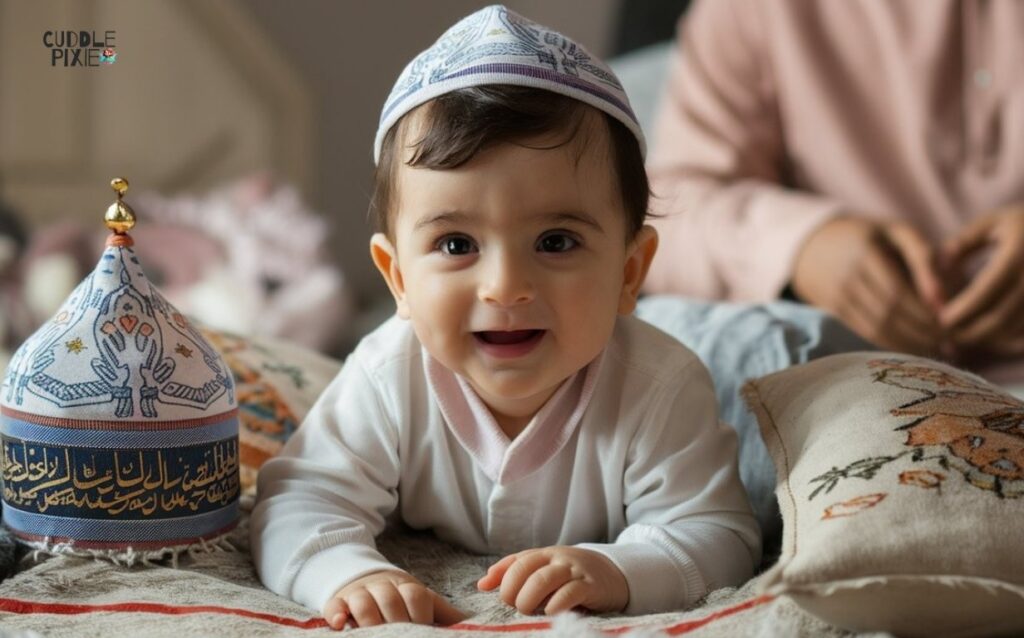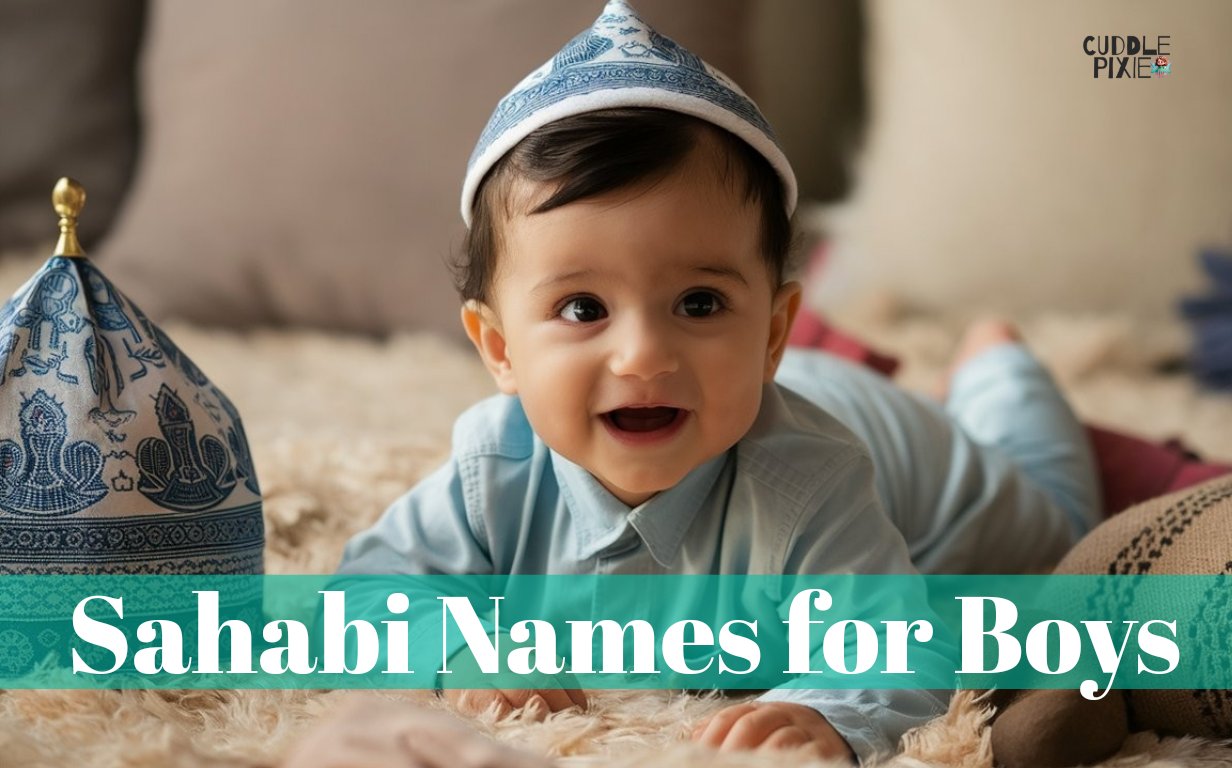Choosing a name for your baby is a significant decision, especially within the Islamic tradition where names carry deep meaning and history. Sahabi names, which refer to the companions of the Prophet Muhammad (PBUH), are particularly revered. These names not only honor the legacy of these esteemed individuals but also imbue a sense of faith and cultural heritage. In this guide, we delve into the rich tapestry of Sahabi names for boys, offering a comprehensive list, their meanings, and historical context to help you find the perfect name for your child.
In This Article
What are Sahabi Names?
The Sahabah were the loyal followers and companions of the Prophet Muhammad (PBUH). Their unwavering support and dedication to Islam during its formative years are well-documented in Islamic history. Naming a child after a Sahabi is a way to honor their legacy and impart the virtues they embodied, such as bravery, wisdom, and piety.
Tips for Choosing the Perfect Name
- Meaning: Ensure the name has a positive and significant meaning.
- Pronunciation: Choose a name that is easy to pronounce and spell.
- Family Traditions: Consider names that may have familial or cultural importance.
- Modern Acceptability: While honoring tradition, ensure the name fits well in contemporary society.
List of Sahabi Names for Boys

- Abbad: Meaning “great worshiper”, Abbad ibn Bishr was known for his devoutness.
- Abdullah: Meaning “Servant of Allah”, this name was borne by several Sahabah, including Abdullah ibn Abbas and Abdullah ibn Umar, known for their deep knowledge of Islam.
- Abu Bakr: The first Caliph of Islam, a close companion of the Prophet, known for his piety and leadership.
- Akrimah: Akrimah ibn Abu Jahl, known for his valor and later conversion to Islam.
- Ali: Meaning “exalted” or “noble”, Ali ibn Abi Talib was the fourth Caliph and a cousin of the Prophet.
- Ammar: Ammar ibn Yasir was a close companion known for his unwavering faith and endurance through persecution.
- Anas: Anas ibn Malik was a devoted companion known for his service to the Prophet.
- Bilal: Bilal ibn Rabah, the first muezzin, was known for his beautiful voice and dedication to the call to prayer.
- Bara: Al-Bara ibn Malik was known for his bravery in battle.
- Hamza: The uncle of the Prophet, known as the “Lion of Allah” for his bravery.
- Hassan: Grandson of the Prophet, known for his piety and leadership.
- Hussein: Another grandson of the Prophet, remembered for his martyrdom at the Battle of Karbala.
- Ibrahim: The name of several Sahabah, meaning “father of many”, also a prophet in Islam.
- Ismail: Companion known for his loyalty and bravery.
- Jabir: Jabir ibn Abdullah was a prolific narrator of Hadiths.
- Jafar: Jafar ibn Abi Talib, known for his eloquence and martyrdom in battle.
- Khalid: Khalid ibn al-Walid, known as the “Sword of Allah” for his military prowess.
- Muawiyah: Muawiyah ibn Abi Sufyan was the founder of the Umayyad Caliphate.
- Omar: Omar ibn al-Khattab, the second Caliph, known for his justice and administrative reforms.
- Osman: Osman ibn Affan, the third Caliph, known for compiling the Quran into a single book.
- Habib: Meaning “beloved”, several Sahabah carried this name, noted for their devotion.
- Harith: Meaning “the plowman” or “the cultivator”, Harith ibn Rab’i was known for his contributions to early Islamic society.
- Hashim: Hashim ibn Utbah, known for his bravery in battle.
- Hudhayfah: Hudhayfah ibn al-Yaman was trusted with the secrets of the Prophet.
- Hussain: Hussain ibn Ali, grandson of the Prophet, remembered for his sacrifice at Karbala.
- Ikrimah: Ikrimah ibn Abi Jahl, known for his later conversion and dedication to Islam.
- Imran: Meaning “prosperity”, it was also the name of the father of Maryam (Mary), mother of Isa (Jesus).
- Iyas: Iyas ibn Mu’awiyah, known for his intelligence and fairness as a judge.
- Jabir: Jabir ibn Abdullah, known for his knowledge and narration of Hadith.

- Kaab: Kaab ibn Malik, known for his poetry and companionship of the Prophet.
- Khabbab: Khabbab ibn al-Aratt, known for his early conversion and suffering for the cause of Islam.
- Luay: Luay ibn Ghalib was an ancestor of the Prophet Muhammad.
- Muadh: Muadh ibn Jabal, known for his knowledge of the Quran and jurisprudence.
- Muawiyah: Companion known for his leadership and founding the Umayyad dynasty.
- Mughira: Mughira ibn Shu’ba, known for his wisdom and counsel.
- Musab: Musab ibn Umair, known for his dedication and missionary work in Medina.
- Nafi: Nafi ibn Abdul Harith, known for his knowledge and piety.
- Nuaym: Nuaym ibn Mas’ud, known for his strategic mind in battles.
- Qasim: Qasim ibn Muhammad, grandson of the Prophet, known for his scholarly contributions.
- Rafi: Rafi ibn Khadij, known for his participation in battles and narration of Hadiths.
- Saad: Saad ibn Abi Waqqas, known for his military leadership and prayers.
- Safwan: Safwan ibn Umayyah, known for his generosity and later conversion to Islam.
- Salman: Salman al-Farsi, known for his wisdom and conversion to Islam from Persia.
- Suhaib: Suhaib ibn Sinan, known for his eloquence and loyalty.
- Talha: Talha ibn Ubaydullah, known for his bravery and support during battles.
- Thabit: Thabit ibn Qays, known for his oratory skills and bravery.
- Thumama: Thumama ibn Uthal, known for his conversion story and influence.
- Ubadah: Ubadah ibn al-Samit, known for his wisdom and leadership.
- Umar: Umar ibn al-Khattab, second Caliph, known for his justice.
- Usama: Usama ibn Zayd, known for his leadership and close relationship with the Prophet.
- Utbah: Utbah ibn Ghazwan, known for his military leadership.
- Uthman: Uthman ibn Affan, third Caliph, known for compiling the Quran.
- Wahb: Wahb ibn Munabbih, known for his knowledge and narrations.
- Waleed: Waleed ibn Uqbah, known for his contributions to early Islamic society.
- Yasir: Yasir ibn Amir, known for his steadfastness in the face of persecution.
- Yazid: Yazid ibn Abu Sufyan, known for his administrative skills.
- Zaid: Zaid ibn Haritha, the adopted son of the Prophet, known for his loyalty and leadership.
- Zubair: Zubair ibn al-Awwam, known for his bravery and being one of the ten promised paradise.
Top 10 Most Popular Sahabi Names
- Abdullah: “Servant of Allah”, favored for its deep religious significance.
- Ali: “Exalted”, widely popular for its strong historical and spiritual connotations.
- Bilal: Known for his association with the first call to prayer, symbolizing devotion.
- Hamza: “Lion of Allah”, symbolizing bravery and strength.
- Hassan: Popular for its association with the Prophet’s grandson, denoting piety.
- Hussein: Another grandson of the Prophet, revered for his martyrdom.
- Omar: Known for justice and leadership, a name of historical significance.
- Osman: Third Caliph, known for his role in compiling the Quran.
- Khalid: “Sword of Allah”, symbolizing military prowess.
- Uthman: “Companion”, third Caliph, known for his piety and leadership.

Unique and Rare Sahabi Names
- Ammar: Known for his resilience and early conversion to Islam.
- Harith: Less common, symbolizing cultivation and growth.
- Hudhayfah: Trusted with the Prophet’s secrets, a name symbolizing trust and loyalty.
- Jafar: Known for his eloquence and sacrifice.
- Khabbab: Not widely used, representing early conversion and dedication.
We encourage readers to share their chosen Sahabi names and the stories behind their selection. Understanding the personal and familial significance behind these names adds a rich layer to their historical importance.
Final Words
Choosing a Sahabi name for your child is a way to honor the legacy of the Prophet Muhammad’s companions and instill virtues of bravery, wisdom, and piety. These names carry profound meanings and historical significance, making them a timeless choice for Muslim families.
FAQs
Are Sahabi names still relevant today?
Yes, Sahabi names are timeless and carry historical and religious significance, making them a popular choice.
Can I choose a Sahabi name even if it is not commonly used?
Absolutely. Choosing a less common Sahabi name can make your child’s name unique while still honoring Islamic heritage.
Do Sahabi names have to be Arabic?
While most Sahabi names are Arabic, what matters most is the name’s significance and meaning in Islamic history.
